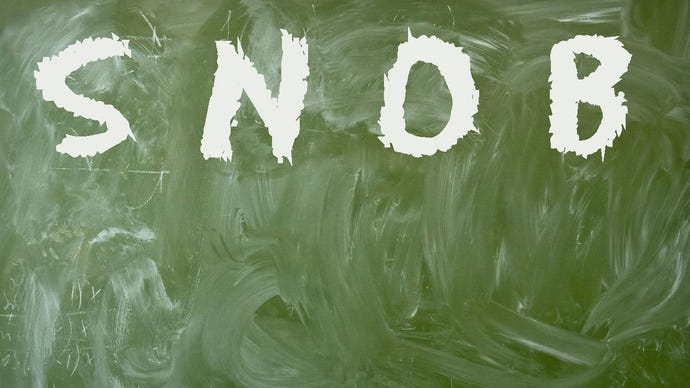Snobbery in games: it's time to turn the page
We need to look at how the book community stands up to snobbishness, says Patrick Garratt, before even more people are turned away from gaming.
"People should never be made to feel bad about what they are reading. People who feel bad about reading will stop reading."
The last few decades have been as testing a time for the book industry as they have for games. While the travails endured by the trade aren't exactly the same as those in the gaming world, the parallels are obvious: books, too, have made a creaking transition to digital; that a single, fore-running retailer has become immensely powerful has fuelled an unquenchable debate about monopoly; there's been a furious war over prices and margins in the new, downloadable world; and the self-publishing explosion has brought with it as much disaster as joy. These topics will sound familiar to anyone enthusiastic enough about games to keep up with the news, but there's one runaway problem the games trade struggles with to a far greater extent than its literary counterpart: snobbery in games is almost completely unchecked.
The "us and them" mentality in books, the notion that literary fiction is more worthy then genre fiction, is now under extreme pressure as the new digital world emerges, and barely a week passes without major outlets and blogs decrying any notion that reading one type of book or another is inappropriate. There's nothing wrong with reading The Hunger Games, or Harry Potter, or Jack Reacher, just as there's nothing wrong with reading Ulysses, or Bleak House, or JR. Read whatever you like, say those covering books. If people read, they spend. It's all good. Reading anything is better than reading nothing.
Unfortunately, neither the games press nor the bulk of public users, wherever it chooses to vent, has yet to reach the same magnanimous conclusion.
Stop at the red light
Naming the names of guilty writers - both professional and otherwise - would be pointless, as the problem in games is so profound it reaches from the top to the bottom and across every genre. Every time the next Call of Duty or FIFA is announced the same eyes roll. We see the same social media table-thumping time and again when Ubisoft shows off the new Assassin's Creed, or we're told in no uncertain terms how the fortune spent on Destiny is indicative of everything wrong in contemporary games.
We see fans queuing to see games at consumer shows openly mocked on professional websites. We see mobile binned as an F2P mess. We see indie sneered over as a sideshow to the main, triple-A event. I've sat in meetings in which executives have written off PlayStation and Xbox with a wave of the hand before claiming "Steam's won". I've read startling articles from certain individuals explaining how the big-budget games industry simply has no aesthetic worth. If you aren't playing independent games focused on social issues you're a moron. Don't like Papers, Please? Idiot. Love Papers, Please? Hipster. Want story and thrills? You're a dick. Enjoy GTA 5? You were last in the brain queue.
And let's be absolutely clear: if you're a professional writer on either side of this debate, you're standing in the way of progress. You are driving people away from games.
We see it in every comments thread. The Glorious PC Master Race. Console peasants. You can keep your shooters, your indie bullshit, your dragon-f**king nonsense. Remarkably, the general mood now is less toxic than at the peak of the last generation's "console wars," but it's ever-present. For some reason, the mud-slinging in games is so pervasive that calls for platform and genre inclusiveness just fall on deafer and deafer ears.
Stop it. Denouncing someone's choice of media, or the way they choose to spend their spare time, doesn't make you intelligent. It makes you a bigot. We should, as both a press and a community, be applauding the fact anyone is playing anything, not belittling those who play software you don't like on systems you may or may not own. As author Matt Haig had it in this piece on literary snobbishness from 2013, "People should never be made to feel bad about what they are reading. People who feel bad about reading will stop reading."
Take a few moments to think about that.
[Image.]


